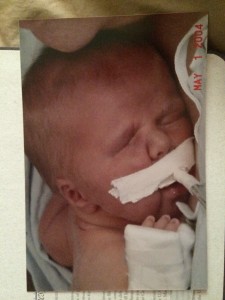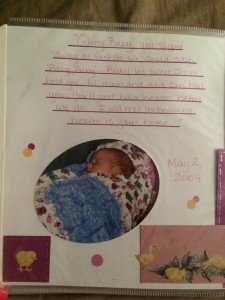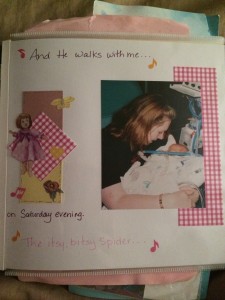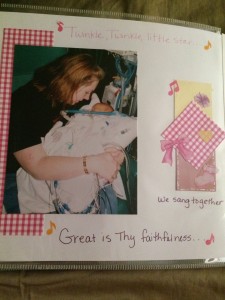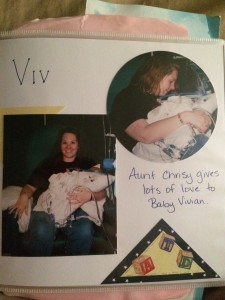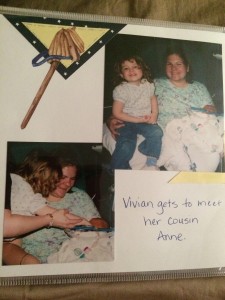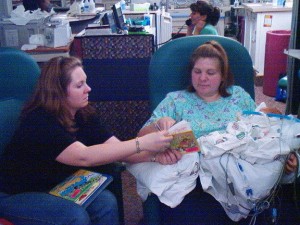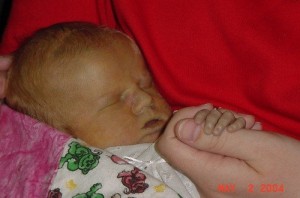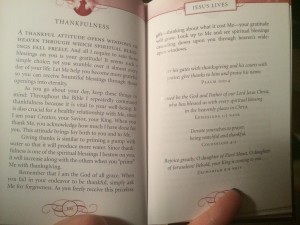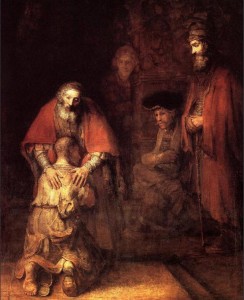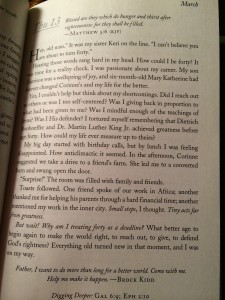(This is a talk I gave at the Highland Business Women’s Club on April 14, 2014. While targeted to women, I am sure that men can learn from this as well.)
Picture this. My dining room table, filled with a collection of cups, glasses, and mugs, each with varying amounts of liquid: some three-quarters full of water, some nearly empty of milk from breakfast, some with the dried remains of the morning’s hot chocolate.
This is not a fictional picture I have drawn for you. This is my life. My two children would use so many cups in one day, and never quite finish what was in them, and never put them in the sink, much less the dishwasher, I literally had to assign cups to them and tell them they are only allowed one drinking glass and one hot drink holder. And if theirs is dirty, they have to wash it. Such is the life with a ten and thirteen year old.
The application of this to our lives as women is easy: we don’t get multiple cups to fill up; we just get one. And if you are like me, that one often runs on empty.
As women, we are constantly in pouring-out mode. We are trying to be good wives. We are parenting children and running around for them. We are working, whether at home or away from home. We are trying to be there for our extended families. We are attempting to cultivate friendships and care for those in need. If we are grandparents, we are trying to help our children and grandchildren as much as we can. Our “ought to” list is long, and our “want to” and “need to” lists get put on hold. Indefinitely.
The problem is, with the busyness of our lives, we have forgotten how to refill, how to rest, how to be rejuvenated. And because of that we tend to refill in unhealthy ways or in ways that may themselves be neutral, but turn unhealthy because we do them in excess. We may gorge ourselves on food, electronics, shopping, television, alcohol, Facebook, more commitments, staying busy and more. And when we try to refill with these things, instead of filling our cups, we are simply depleting them even more.
And what happens when we are running on empty
It is never good. One of the most prevalent consequences of running on empty is depression. That is obviously not the only reason that people suffer from depression, but I think it is a big player in our culture today.
I recently finished a book entitled Freefall to Fly by Rebekah Lyons and in it she says:
“Depression and anxiety have many faces. Happy one moment, sobbing the next. Refined, then frayed. More than 57.7 million American adults suffer from some form of mental illness, including 18.1 million who have been diagnosed with depression. The epidemic continues to spiral as we try to somehow manage the stress of modern life with its constant demands…if you’ve ever been close to it—really close…—you know it’s real. Scary real.
“Even more shocking is the number of women suffering depression…we as women are 70 percent more likely than men to experience depression. One in four women will suffer some form of depression in her lifetime. From anxiety attacks…to mood disorders, schizophrenia, bipolar disorder, and so on, women are under siege. And the majority of women who are wrestling with depression fit nicely into the twenty-five to forty-year-old age bracket.
“We aren’t depressed because we are getting old. We are depressed in the prime of our lives.
“During the years when we ought to be making some of our greatest contributions to others and to the world, we are stuck. Caught in a quagmire of confusion, hardly able to put one foot in front of the other.”
These are frightening statistics. And I fall squarely into this category. After years and years of giving and giving, I finally broke. It wasn’t all at once; it was a slow decline. What started as what I would have called a seasonal issue, turned into a constant one. I was turning into the angry and yelling parent I didn’t want to be. I was picking fights with my husband. I was unhappy and burnt out in my work. I would cry in my bed for hours at a time. I had finally hit the bottom of my glass.
In addition to depression and as a result of depression, other consequences of running on empty include physical health issues, and relationships that suffer – from our spouses, to our kids, to our friends.
You don’t have to raise your hand, but can any of you see yourselves either here or headed here? Or have you been here before?
It’s not a pretty place to be. In fact, it is a scary place to be. Scary because we haven’t been here before. Scary because we have. Scary because we don’t really know how we got here and scary because we don’t know how to get out.
For those of you there now, there is hope. For those of you who are headed in that direction, there is hope. For those of you who may find yourself there in the future, there is hope. Our cups can be refilled. We can reverse the damage of running on empty.
There comes a moment when we have a decision to make. A decision not to allow our cups to be emptied any further. A decision to purposefully refill our cups.
For us as women, it is not an easy decision, but it is a necessary one. It isn’t easy because it means that we have to say no to something or many things so we can say yes to what is needed and necessary.
The decision is this one. To rest.
Since creation, there has been a rhythm that was established by God: a rhythm of work and rest. According to Genesis after six days of work, God rested on the seventh day. In Exodus and other books of the Bible, He commanded the Israelites to work six days and rest on the seventh. He said that the fields should be worked for six years and then left to rest in the seventh year. This rhythm of life is necessary in order to continue on the path that we are on.
But rest doesn’t come easy for us, as women. Our lists are long. We fear we will drop the ball on something. We have errands to run. Kids to care for. Families to feed.
But the truth of the matter is this, if we don’t stop to rest, none of the things on our to-do list will be done well. Remember what they tell you on a plane? If you are traveling with those who need assistance and the need for oxygen masks arises, you are to put yours on first, and then place them on those in need. You know why? Because we are no good to anyone when we have passed out from lack of oxygen. In the same way, we are no good to anyone when we are running on empty.
For me, this looks different on different days. Some days rest is sitting on my porch swing with music. Some days rest is sitting on my porch swing surrounded by friends. Some days rest is taking a nap on my couch. Some days rest is taking my kids to the zoo. Some days rest is vegging in my bed with an episode of Lost or Castle. Some days rest is reading a book. Some days rest is dinner with my husband or a friend. Some days rest is getting drinks with some friends. Most days rest is exercising and eating well. Every night before bed rest is reading my devotionals, my Bible, and journaling.
Rest doesn’t have to look the same every time. But it does have to be something that fills your cup. And it does have to be scheduled.
One thing I have learned is to look at my calendar each week and figure out when I can schedule some down-time. Some of you may have to actually write it in on the calendar. And you may not even know exactly what that rest time will look like until the time comes, but you have to create it. It won’t just magically appear. I know that I have to go upstairs at a certain time each evening so I have time to sit with my Bible and my journal. I know I have to go to bed at a certain time so that I can get up and exercise. I have learned these things about myself and about what I need in order to make sure I am not running on empty. This is hard for me. I am by nature a night owl and would love to fall asleep to the TV playing Friends re-runs every night. But when I let myself fall into that kind of rut, I start fading again.
I have been reading a book with my Bible study group recently that is written by Jen Hatmaker entitled 7. Each week for the last seven weeks, we have been fasting from something: food, clothing, possessions, waste, spending and this week we are fasting from stress.
Impossible, right? But what that looks like for me is six alarms set on my phone. Six a.m., nine a.m., noon, three p.m., six p.m., and nine p.m. These alarms remind me to stop and take a moment to whisper a prayer. To rest for a moment. To read a scripture. To take a break from the “urgent” things I am working on.
I am bad at this. But I think it is a good rhythm for me. One that may just continue past this week. Because it is an alarm on my phone, which I always have with me, and may just be the cause of some of the stress and emptiness of my cup, it forces me to listen and be attentive to the call to rest.
Rest is imperative for us if we want to keep our cups full. But, there is also a second thing that is necessary for keeping our cups full. God fills us up when we rest but not so we can stay full. He fills us so that we can give more of ourselves. “Jesus is the source of a spring of living water that is always bubbling up, an unfailing source, ever fresh.” The well of Christ never runs dry – we will always have what we need when we receive His filling. And as a result of that, if we are filling ourselves up with Christ and the rest that we have been called to, the more we give away, the more we will get.
“In John 7:38, Jesus says, “If anyone is thirsty, let him come to me and drink. Whoever believes in me, as the Scripture has said, streams of living water will flow from within him.” Again and again Jesus invites us to come to Him because He is the fountain of life. He knows that life is difficult and [He] offers us strength. Not only does He delight in filling our cup with His everlasting love and perfect peace, He will fill it to the fullest measure. The best part is that it will actually overflow onto all that we meet. And no one is more pleasant to be around than someone who has had her cup filled with the living God…This will free her up to love others unconditionally…” (Quoted from this blog.)
When we take the time to rest, to fill our cups, we will actually be able to complete those to-do lists better, with more energy, with more love, with more compassion, with more hope, than we ever could have when our cups were empty.
When the depression hit me hard, I had to seek help from medical professionals, and it is good that I did, but I also had to reorient my life and allow time for rest and rejuvenation. And I don’t do a great job of this all the time. In fact, it took God removing me from a job I had for over 13 years and placing me in a different area of ministry to really reinforce some of these principles of rest. But I always know when I stop planning for rest: my pace becomes hectic, I begin feeling burnt out, the depression ramps up, and I crash. When that happens, I have to stop; I have to choose to re-commit and make time for rest in my schedule, because I want to be able to give of myself to my family, to my friends, and to my God.
I encourage you to go home and open your calendars tonight, while this message is fresh, and start scheduling time for rest, so you, too, can be filled to overflowing and give of yourselves in new and fresh ways.

